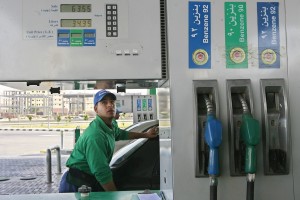
(AFP Photo)
By Mohamed Adel
The government will not be able to meet the petroleum subsidy bill it has set in the budget for the 2014/2015 fiscal year (FY), according to former Petroleum Minister Osama Kamal.
Kamal’s comments come on the heels of the interim governement’s Monday announcement of its budget for the coming fiscal year, in which it has reduced allocations for petroleum product subsidies in to approximately EGP 104bn, compared to 134 for the current year, by raising fuel prices on the local market. The electricity subsidy bill was increased to EGP 33bn as opposed to EGP 18bn in the draft budget that was submitted to the president, according to an official statement from the finance ministry.
Kamal said that measures to be taken to cut these subsidies should have been announced at least one month before the budget. He emphasised that it will prove difficult for the coming government to take any action to alter prices in light of an unstable economic situation for citizens, and it was necessary for the state facing an increase in vehicle gas usage to keep abreast of developments and provide cars that run on electricity.
The size of structural imbalances among public finances increased throughout the previous fiscal year. The volume of spending on energy subsidies in 2013 was two times as much as education and four times as much as health spending. Around 40% of the volume of energy subsidies is allocated to the rich, while those with lower incomes receive only 10%, according to an official statement by Finance Minister Hany Kadry Dimian.
Arab countries offered a petroleum grant last year valuing EGP 80bn, which aided greatly in providing petroleum products needed for the domestic market in light of an inability to provide necessary liquidity for imports, according to Kamal.
The energy subsidy bill increases by approximately 15% per year and is expected to reach EGP 145bn in the coming fiscal year, in the absence of a price adjustment. The 2014/2015 budget included the first steps to avoid imbalances in fuel subsidies and achieving social justice. This will begin through a subsidy reform valuing EGP 104bn in the new general budget, and includes measures to reform price changes while ensuring that they do not affect low-income citizens and the poor, according to a statement by the finance ministry.
Incentives to increase fuel efficiency and expand smartcard usage for distributing petroleum products to citizens will be established in order to achieve distributive justice, prevent smuggling, and ration consumption. The development of new energy sources and renewable energy, especially solar, will be encouraged, and efficient usage increased.
The local market requires approximately 18bn litres of diesel for the coming fiscal year and in order for the government to implement its subsidy ration plan; diesel should be raised to EGP 2.10 from 1.10, which will save EGP 18bn, according to predictions by Medhat Youssef, oil expert and former Vice President of the Egyptian General Petroleum Corporation (EGPC).
In terms of gasoline, the local market will require approximately 10bn liters during the 2014/2015 fiscal year, and the government must add EGP 1 to the price of a liter in order to provide for the EGP 10bn value of the subsidy bill.
He pointed out that the government will raise the prices of liquefied petroleum gas outside of the smart card system, according to the share that will be specified for each family. It will be sold to the consumer at free trade prices in order to allow it to generate at least EGP 5bn, according to Youssef.
Regarding the government’s increasing electricity subsidies for the coming fiscal year to approximately EGP 33bn, compared to EGP 18bn last year, the increase will be utilised to fund new and renewable energy projects and pay part of the electricity generation subsidies to producing companies, according to Salah Sobky, former head of the Energy Research Center.
He pointed out that the numbers for subsidy allocations will change after a price increase to sell electricity to industrial producers, according to a proposal that is currently being studied by the cabinet.



